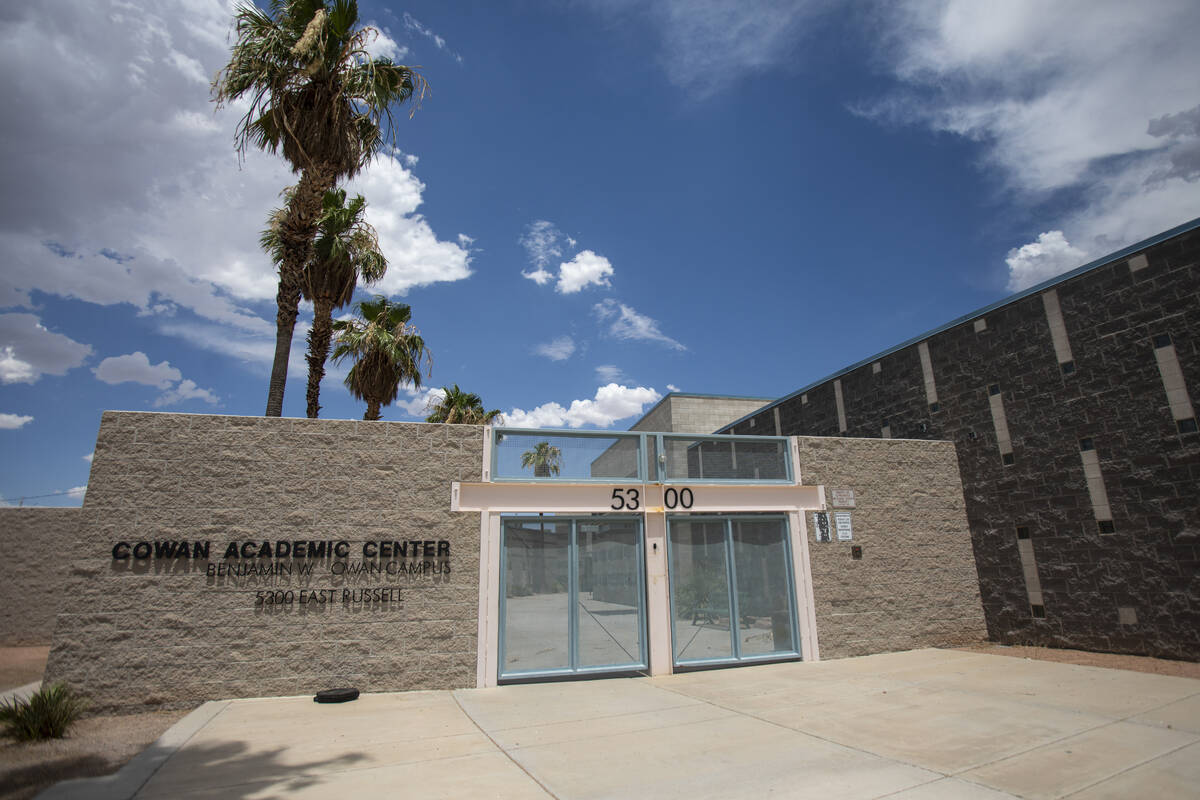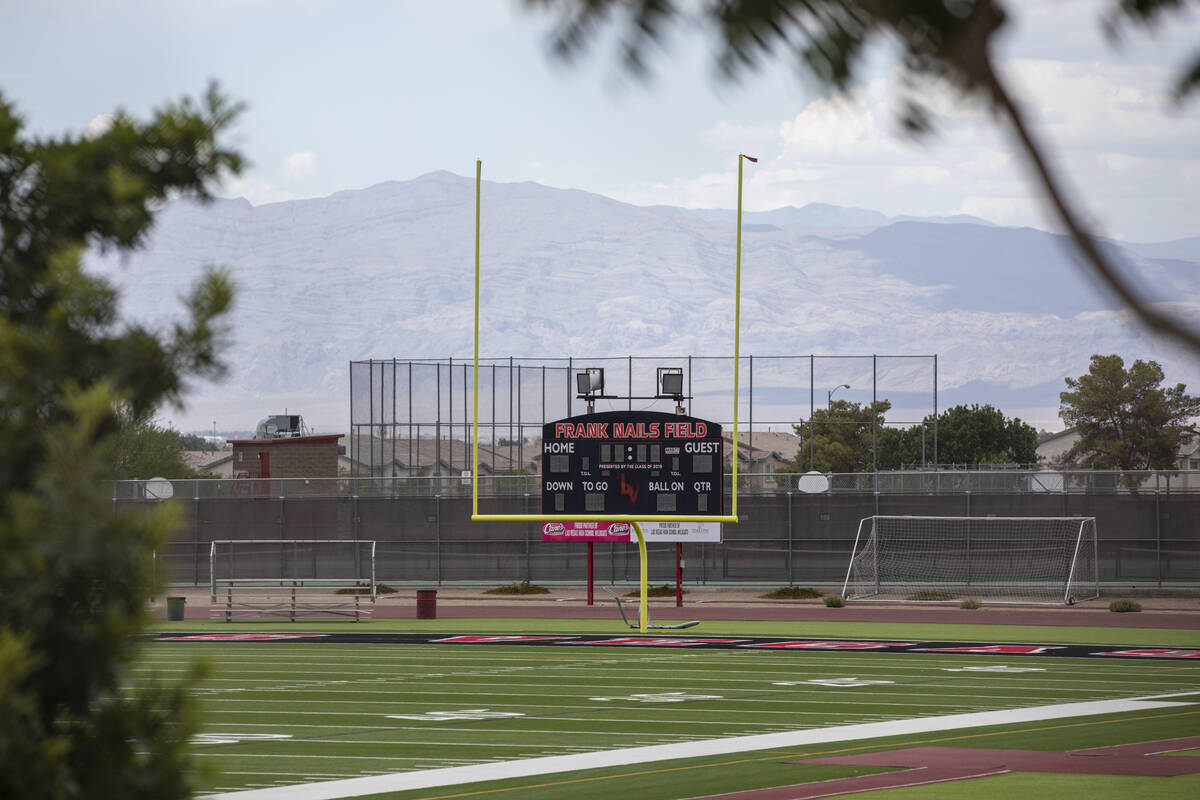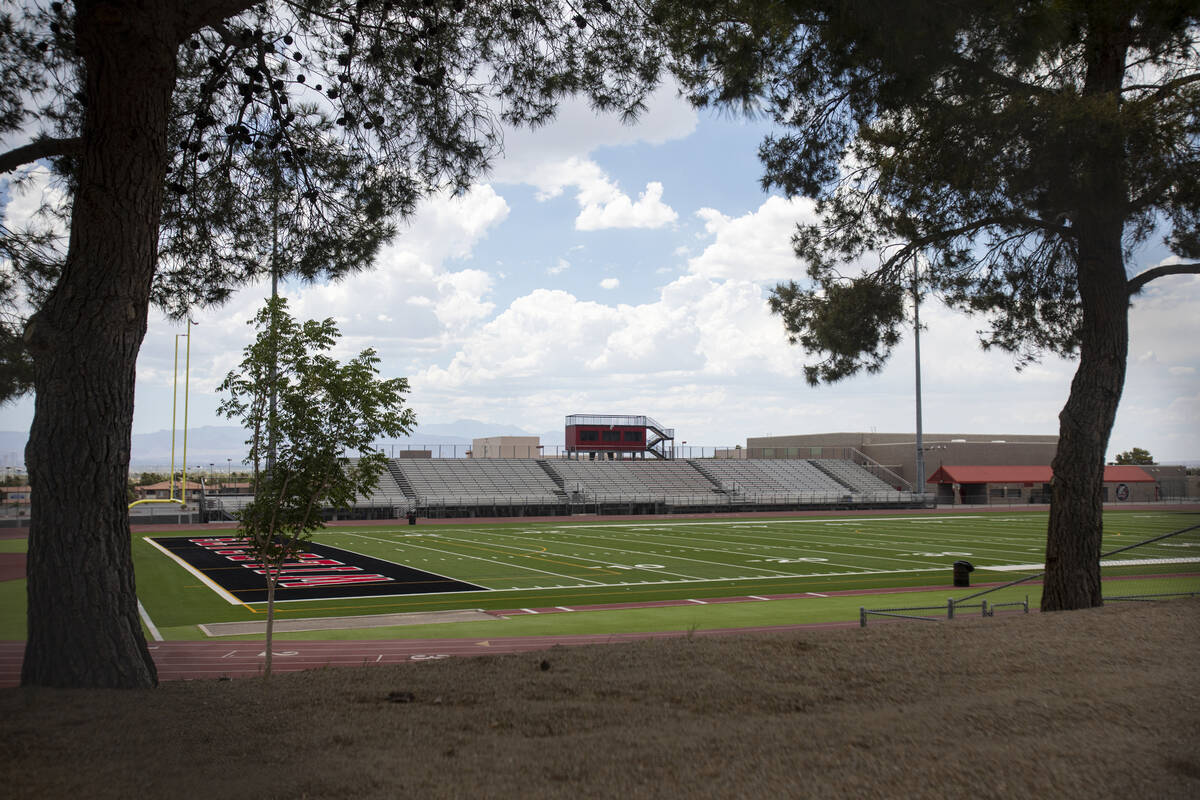‘There should be some accountability’: CCSD schools’ spending raises red flags
At Las Vegas High School, officials did not report a possible theft of funds from an athletic program or fully cooperate with auditors. There also were questions about hefty spending on meals for coaches and on travel.
Employees at Rogers Elementary bought decorations and party supplies for a family engagement event with a spending card that was only supposed to be used for work-related purchases. They did not reimburse the school district.
And at Cowan Sunset High School, staff used the same type of card to buy a portable treadmill and other personal items at the request of an assistant superintendent, who also did not reimburse the district.
Those were just some of the problems that Clark County School District auditors found during their reviews of campus finances. The reports aren’t readily available online and must be requested. To track school spending, the Las Vegas Review-Journal examined more than 420 audits that covered around 350 schools. (Dozens of campuses were examined more than once in recent years.)
Internal auditors found few or no problems at many schools. But they also uncovered issues across the district that included inappropriate spending and inadequate documentation.
On top of that, they noted dozens of times that issues they were flagging had been brought up in prior reports, the Review-Journal found. There was no evidence that the district, which refused to comment for this story, made any changes as a result of the repeated findings.
Geoffrey Lawrence, director of research at the Nevada Policy Research Institute, said it’s a big deal when auditors find issues that were raised before, as it indicates management did not follow through on fix-it plans.
“There should be some accountability mechanism,” Lawrence said, adding that higher-ups should not be allowed to “repeatedly ignore” auditors’ concerns.
Among the issues that auditors noted had been raised before:
— Virgin Valley High School’s banker did not report some donations valued at $1,000 or more, including one valued at $27,400, on the required form.
— Hancock Elementary’s office manager had not sent funds from one account to the district for at least four school years.
— Las Vegas Academy of the Arts personnel maintained large balances in several accounts so as a result, they “did not always use these funds on the students who raised them,” examiners reported.
‘Will they be perfect? No’
Marguerite Roza, director of the Edunomics Lab research center at Georgetown University, said many issues could be chalked up to misunderstandings. But the point of an audit is to correct behavior so it doesn’t happen again, and people need training, she noted.
“Why do the audit if the system isn’t going to learn from it?” she asked.
But Carol MacLeod, senior project manager of the Alliance for Smarter School Spending at the Government Finance Officers Association, said there could be numerous reasons why auditors find the same issue more than once at a school, including staff changes.
She figured that the tally of repeat issues tracked by the newspaper wasn’t concerning, especially given the size of the district. It indicates the district takes the audit process seriously and is trying to correct procedures, she said.
The Clark County School District is the fifth largest in the nation, with more than 300,000 students and 40,000-plus employees.
“Will they be perfect? No,” MacLeod said.
Nevada, with the bulk of its population in Clark County, has a long track record as one of the worst-performing states in the nation for education.
Its per-pupil spending in public schools, $11,677, was well below the national rate of $15,633, according to federal data released this spring. Gov. Joe Lombardo last year approved the largest education budget in Nevada history with an increase of $2.6 billion.
However, his finance office later touted the notion that how money is spent on schooling “is a greater indicator of success than the amount spent alone.”
The audits examined by the Review-Journal did not address CCSD budgeting or educational performance. Instead, auditors stated that they looked at the records, procedures and internal controls of the school bank, procurement cards and payroll.
The audits were produced between 2020 and early 2024 and typically included responses from the school principals.
In general, these kinds of reports are not fraud investigations but seek to determine if schools are following procedure, according to MacLeod.
For instance, if a staff member bought something with a district credit card, who approved the use of a card?
“They need accountability up and down,” she said.
From ‘clean’ to ‘at risk’
Under CCSD’s ratings scale, examiners determined that nearly 100 school audits were “clean,” meaning there were no reportable issues, and more than 290 others were “normal,” meaning they had common compliance issues.
The district also deemed 22 school audits a “priority,” meaning there were deficiencies that needed to be revisited sooner than normal. Another 10 were labeled “at risk,” meaning the schools had a general lack of controls and “non-adherence” to district policies and procedures.
Green Valley High School, for instance, was deemed “at risk” in 2022. Among other concerns, examiners found that several activity accounts had large balances, and as such, the school “did not use the funds on the students who raised them.” The principal was aware of some potential future uses of the money, but advisors had not submitted written explanations for the balances.
School personnel also used nearly $92,000 of student Advanced Placement exam fees for the choir program rather than sending the funds to the district. The money was moved to help with refunds while awaiting insurance reimbursement for a canceled trip, but when those proceeds came, the school did not remit the money, the audit said.
The school banker also transferred nearly $40,000 from the orchestra account to the capital improvement account, meaning the school, again, did not use the money to benefit the students who raised it, auditors said.
In his response to the audit, Green Valley High Principal Kent Roberts attributed the activity-account balances to groups saving money for big purchases or projects.
But he said he would remind coaches and advisers to use the funds in a way that benefits students “as quickly as is feasible,” and he would seek written explanations for any large balances.
As for the account transfers, he said that when “possible and appropriate we will make sure that funds are placed into the proper accounts so that they can be used properly.”
Roberts did not respond to a request for comment.
Procurement card problems
The audits also highlighted widespread fundraising efforts in Clark County schools and the paperwork needed to handle finances on campus, including, at times, intricate rules that could be easy to run afoul of. Some schools, for instance, were flagged for not recording voided receipts on reverse-transaction logs.
Auditors also noted that dozens of schools had procurement-card problems.
Under district policy, these cards have spending limits and other restrictions and can be used to pay for work- or instruction-related supplies and materials. They also can be used for travel expenses with a pre-approved request form.
Among 426 school audits examined by the Review-Journal, 159 of them, or 37 percent, cited issues with procurement cards. These included inadequate supporting documentation, incomplete logs, and transactions coded to the wrong accounts.
At least 35 audits also reported that school personnel had split transactions. Examiners routinely paired those findings with warnings not to split transactions over $2,000 or $3,000, and that doing so to “circumvent established limits could result in the loss of use of the cards.”
In 2021, auditors reported that Liberty High School, for instance, had split several transactions and that a similar issue was noted in a prior audit. The principal replied that personnel would not split transactions over the capped limit.
However, auditors reported in 2022 that Liberty had again split some transactions — and the principal, again, promised this would not happen.
Under CCSD’s purchasing-card manual, splitting transactions can result in infraction memos to administrators and other higher-ups, with the third offense resulting in a 60-day suspension of card privileges. The total purchase value cannot exceed the upper limit unless the deputy chief financial officer authorizes it for “specialized purposes,” such as travel costs or emergency transactions by the purchasing department, the manual says.
Computers, printers and other items must be acquired through the purchasing department, according to auditors, who found several cases of inappropriate transactions with procurement cards.
Mountain View Elementary bought furniture and appliances for the staff lounge with the cards instead of through the purchasing office. In “several instances,” Desert Oasis High personnel bought laptops and monitors with the cards, and they split one of those transactions. Liberty High also spent nearly $62,000 on landscaping and maintenance services with the cards instead of going through the purchasing department, auditors found.
Scherkenbach Elementary paid for ski rentals and lessons for a field trip with the cards but did not reimburse the district.Cram Middle School personnel used a procurement card to buy gift baskets that were given to staff members.
Robert O. Gibson Leadership Academy personnel bought retirement gifts and field-trip admission fees with the cards and did not reimburse the district. They should instead use school-bank money for those kinds of purchases and pay the district back, auditors reported.
Also, Cowan Sunset High used the card to buy a portable treadmill, thank you cards and “other items for personal use” at the request of an assistant superintendent for education services, according to an audit last year.
The report did not name the administrator, who is no longer in the position, or say how much money was spent at that person’s request.
‘May have resulted in the theft of funds’
Among the schools, one in particular stood out for the severity of issues: Las Vegas High School.
Auditors labeled the east-side school “normal” in 2021. But last year, examiners deemed it “at risk” in a regular audit and also produced an “investigative audit” that focused on its football and flag-football programs.
Las Vegas HS Investigative Audit by Tony Garcia on Scribd
Among other issues, the investigation found:
School personnel were aware of possible violations of district regulations that “may have resulted in the theft of funds” from the flag-football program, but they did not notify the administration or school accounting office or “fully cooperate” with auditors. The audit did not say whether police were ever contacted.
CCSD police Lt. Bryan Zink said he was unable to find a report on the matter. The Metropolitan Police Department said it was not involved.
Meanwhile, the flag-football coach “did not maintain adequate documentation” on entry fees, admissions or concession sales from a tournament and would not respond to auditors’ questions.
Also, buses were chartered to attend out-of-town camps, but some coaches chose to drive their own cars, incurring “additional fuel expenses for which they were reimbursed.”
Coaches were reimbursed about $4,477 for food and meals during one school year, buying several meals late at night or early in the morning for coaches and other adults but not players, said the audit, which noted that the total dollar amount “appears excessive.”
And for the football team’s trip to Reno, school personnel “maintained inadequate supporting documentation for $20,192.24 in disbursements for airfare, hotel, and per diem. Due to the inadequate support, the validity of the expenses could not be determined.”
Overall, because of the lack of internal controls and supporting documentation at Las Vegas High, auditors could not “rule out the possibility that funds may have been received that school personnel did not deposit with the banker,” nor could they rule out the possibility of other inappropriate spending.
Principal Raymond Ortiz referred questions from the Review-Journal to the school district’s media office.
He wrote in his response to the audit that staff would be told to notify administrators or school accounting if they became aware of violations and to fully cooperate with auditors.
Coaches who choose to drive their cars when charter buses are used will not be reimbursed, unless they’re hauling equipment, and supporting documentation for airfare and other travel costs will be “maintained and made available upon request,” the principal wrote.
Ortiz also wrote that the flag-football coach was fired from his position, and that the football team was not allowed to travel to an out-of-state game last year “due to lack of funds.”
Contact Eli Segall at esegall@reviewjournal.com or 702-383-0342. Segall is a reporter on the Review-Journal’s investigative team, focusing on reporting that holds leaders, businesses and agencies accountable and exposes wrongdoing. Review-Journal staff writer Mary Hynes contributed to this report.


























